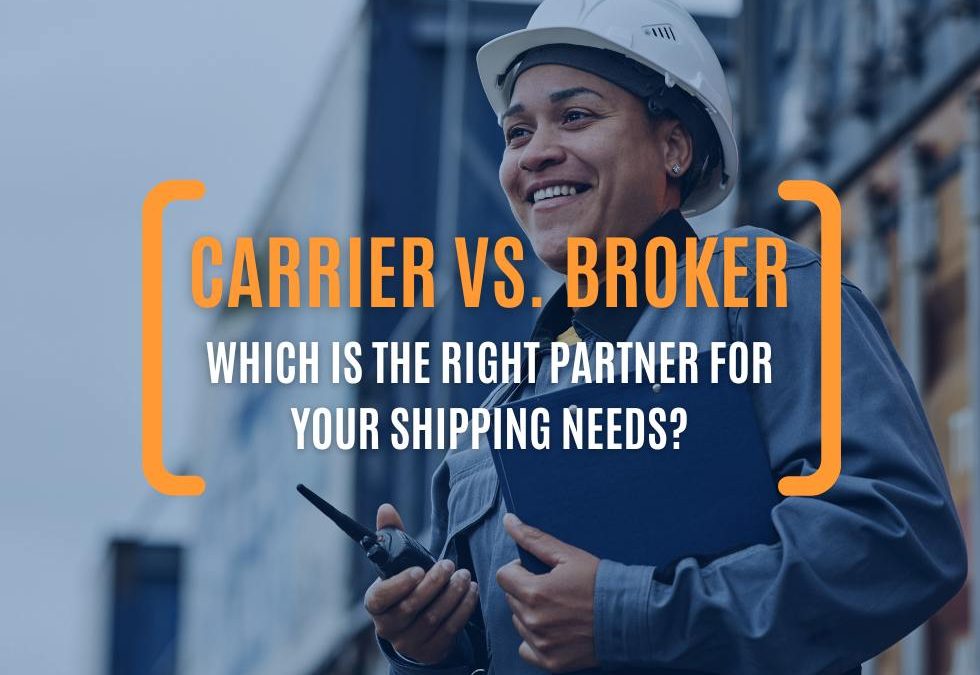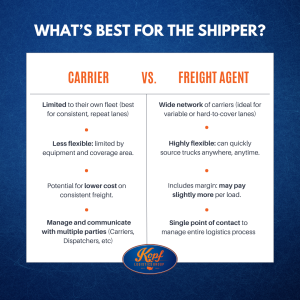As a Shipper, choosing the right logistics partner can make all the difference in keeping your freight moving smoothly and cost-effectively. In this article, we’ll break down the key differences between working directly with a Carrier and partnering with a Freight Broker, so you can decide which option best fits your shipping needs.
We’ll look at how these two models compare when it comes to control, cost, liability, and flexibility and why both play important roles in today’s supply chain. You’ll also learn how Carriers offer hands-on control and dedicated equipment, while Brokers add value to Shippers with access to a vast Carrier network, strong rate-negotiation power, and convenience.
Whether your business runs on steady, predictable freight or fluctuating seasonal demand, understanding the Carrier vs. Broker approach will help you make smarter logistics decisions.
What is a Freight Broker vs. Carrier?
Freight Brokers and Carriers both play important roles in the transportation and logistics industry.
What Does a Freight Carrier Do?
Carriers own and operate equipment, handle the actual transportation of freight, and assume responsibility for safe delivery. They literally “carry” freight from point A to point B.
What Does a Freight Broker Do?
Brokers act as intermediaries, arranging loads, negotiating rates, and coordinating between Shippers and Carriers without necessarily owning trucks. Some Brokers are asset-based which means they also own trucks (like Kopf).
So while Carriers are the ones actually transporting the freight, Brokers coordinate all the logistical details to make certain that happens.
Key Differences Between Broker and Carrier
There are three main differences between Carriers and Freight Agents (working under the authority of Freight Brokers): control, liability, and pricing.
Control
Since a Carrier owns and operates their own equipment, Shippers have direct control over the transportation of freight. When a Shipper works directly with a Carrier, their freight will be transported on that Carrier’s equipment with that Carrier’s Drivers. The Shipper is much more involved in the details of the process, which is ideal for Shippers with in-house logistics who want hands-on control.
In contrast, when working with a Freight Agent, a Shipper is not involved in the logistics of transporting their freight. A Freight Agent relies on their vast Carrier network to match the right Carrier to the right shipment. As logistics experts, Agents have access to a variety of different lanes/routes, regions, and types of freight, whether that be dry van, refrigerated, flatbed, LTL, etc. The result? Greater flexibility, availability, and reliability for the Shipper. In addition, the Agent takes care of any issues that arise and communicates to the Shipper directly. This is ideal for Shippers who do not have an internal logistics team and want a more hands-off approach.
Liability
Carriers often take primary liability for freight while it is in their possession. In the US, under the Carmack Amendment the Carrier is liable for loss, damage, or delay to the shipment unless the damage falls under certain exceptions. The Carrier also holds cargo insurance to cover these potential losses.
In contrast, Freight Agents do not take on direct liability for the freight. Freight Agents are not Carriers and therefore are not liable for cargo loss or damage. However, Freight Agents can face indirect or contractual liability if they misrepresent a Carrier’s qualifications or safety record or agree in a contract to assume certain responsibilities.
For instance, if a Freight Agent books a Carrier to move a shipment from Chicago to Dallas and the goods are damaged en route, the Shipper files a claim against the Carrier. The Freight Agent may assist with the claim process, but the Carrier’s insurance typically pays for the loss.
One more note: A Freight Agent works under a Freight Broker’s operating authority. A Freight Broker is required to be licensed by the Federal Motor Carrier Safety Administration and secure a surety bond. This provides peace of mind for a Shipper.
Pricing
When a Shipper works with a Carrier, over time this results in a reliable partnership and the Carrier might be able to provide a discounted contracted rate. Keep in mind this is not guaranteed, but it is a possibility.
Since a Freight Agent is an intermediary between a Shipper and a Carrier, they do include a margin in their rate for their services. However, Freight Agents have access to a wider network of Carriers and as such have the potential to negotiate within their network to provide cost-savings for Shippers as well. This vast network reach is one of the key differences between working with Carriers and Freight Agents.
This means there is potential for cost savings working with either Carriers or Freight Agents.
Benefits of Working with a Carrier
Now that we’ve considered what Carriers and Freight Agents do, key differences between control, liability, and pricing, let’s dig in deeper into the benefits of working with each. There are three main benefits of working with a Carrier: reliability, cost control, hands-on control.
1. Strong Carrier Relationships
Direct partnerships allow Shippers to build trust and long-term relationships with specific Carriers. This has the potential to lead to dedicated capacity and priority service. For example, if a Shipper moves freight on regular, predictable lanes with the same origins and destinations every week, Carriers can commit trucks or even drop trailers to the Shipper.
Keep in mind, however, that Shippers must seek out and build these relationships in the first place. So if they do not have access to a strong Carrier network, it will be more difficult to find and vet reliable Carriers.
2. Possible Cost Control
Working directly with a Carrier removes a Freight Agent or Broker’s margin or commission. If a Shipper has consistent freight, this can result in better rates and cost control over time with a designated Carrier. This is because Carriers are often more willing to lock in contract rates for consistent freight, protecting Shippers from short-term market volatility.
However, if that Carrier decides to cancel their contract, a Shipper must begin the search process all over again. This is time-consuming and challenging in a highly demanding market.
3. More Hands-On Control
Shippers can directly manage routes, schedules, and performance, rather than relying on an Agent to relay information. Keep in mind, this control is only helpful when a Shipper has an internal logistics team to manage the entire shipment process. If these resources aren’t in place, a Shipper will not be able to manage the logistics process without an Agent.
Bottom line: A Shipper might go directly with a Carrier rather than through a Freight Agent when they have steady freight volumes and the internal resources to manage logistics.
Benefits of Working with a Freight Broker
A Shipper may choose to work with a Freight Agent working under a Broker’s authority instead of going directly to a Carrier because of flexibility, speed, convenience, and access to a wider network.
1. Access to a Large Carrier Network
Freight Agents maintain relationships with hundreds or thousands of Carriers, giving Shippers access to capacity across multiple lanes and modes from truckload to LTL, and everything in between. This is especially valuable when freight volumes fluctuate or lanes are irregular.
2. Flexibility and Fast Coverage
When Shippers face last-minute loads, seasonal spikes, or unexpected disruptions, Brokers can quickly find capacity. Freight Agents can often secure trucks faster than Shippers who only work with a small number of Carriers.
3. Reduced Administrative Burden
Freight Agents handle Carrier vetting, compliance checks, insurance verification, and rate negotiation. This saves the Shipper immense time and resources. All a Shipper needs to do is pick up the phone, talk with their Freight Agent, and the Agent takes care of it.
4. Simplified Billing and Fewer Vendor Relationships
Instead of managing payments and contracts with multiple Carriers, the Shipper has one point of contact. The Freight Agent consolidates invoices and manages all backend coordination.
5. Market Intelligence and Pricing Agility
Freight Agents track real-time market rates and capacity trends. They help Shippers stay competitive on pricing and adjust quickly to market changes due to issues like spikes in fuel or regional shortages.
6. Specialized Expertise
Many Freight Agents specialize in certain industries, freight types, or regions, giving Shippers access to expert knowledge. For instance, some specialize in how to move hazardous materials, liquid bulk, or refrigerated freight.
Bottom line: Shippers who have fluctuating shipping needs, have limited time and logistical expertise, and lack in-house logistics resources greatly benefit from working with a Freight Agent.
When to Use a Carrier vs. a Broker
The decision to use a Carrier or a Freight Agent really comes down to three things: shipment volume, capacity constraints, or control needs. We recommend Shippers ask themselves these strategic questions:
1. Shipment Volume
Do you have consistent freight lanes with predictable volumes, or do your shipping needs fluctuate?
- If consistent: A Carrier may be better since they can dedicate assets and offer stable pricing.
- If variable or seasonal: A Freight Agent can provide flexibility and access to a wider network of Carriers.
2. Capacity Constraints
How much internal capacity and expertise do you have for managing Carrier relationships, tracking, and compliance?
- If strong logistics team: Working directly with Carriers can save on brokerage fees.
- If limited bandwidth or expertise: A Freight Agent can handle vetting, compliance, and daily management.
3. Control Needs
Is your priority lower cost through direct relationships, or faster access to capacity across multiple lanes and modes?
- If cost and relationship control matter most: Consider a Carrier.
- If flexibility, scalability, and quick coverage matter more: Use a Freight Agent.
The Right Choice
Choosing a Carrier or a Freight Agent is dependent upon a Shipper’s business goals and freight needs. Working with a Carrier is often best when you have an experienced in-house logistics team to manage the process. Working with a Freight Agent is ideal if you need flexibility, fast coverage, and don’t have a logistics team to manage the logistics process.
If working with a Freight Agent best fits your shipping needs, here are 11 Questions Shippers Should Ask Before Choosing a Freight Agent.
Questions People Also Ask
What’s the difference between a Freight Broker and a Carrier?
A Freight Agent (working under the authority of a Broker) connects Shippers and Carriers to move loads but doesn’t own trucks. A Carrier owns and operates equipment to transport freight directly.
Is it better to use a Broker than a Carrier?
It depends on your needs. Freight Agents (working under a Freight Broker’s authority) offer flexibility and access to multiple Carriers, while working directly with a Carrier offers more control over the shipment.
Can a Carrier also be a Broker?
Yes. Some companies have dual authority, meaning they operate as both a Carrier and a Broker depending on demand.
What are the risks of using a Freight Broker?
Potential risks include less direct control and possible miscommunication, but reliable Brokers vet Carriers and manage these risks.
How do Carrier contracts differ from Broker agreements?
Carrier contracts include direct delivery and liability terms. Broker agreements focus on load coordination and rate negotiation between parties.


